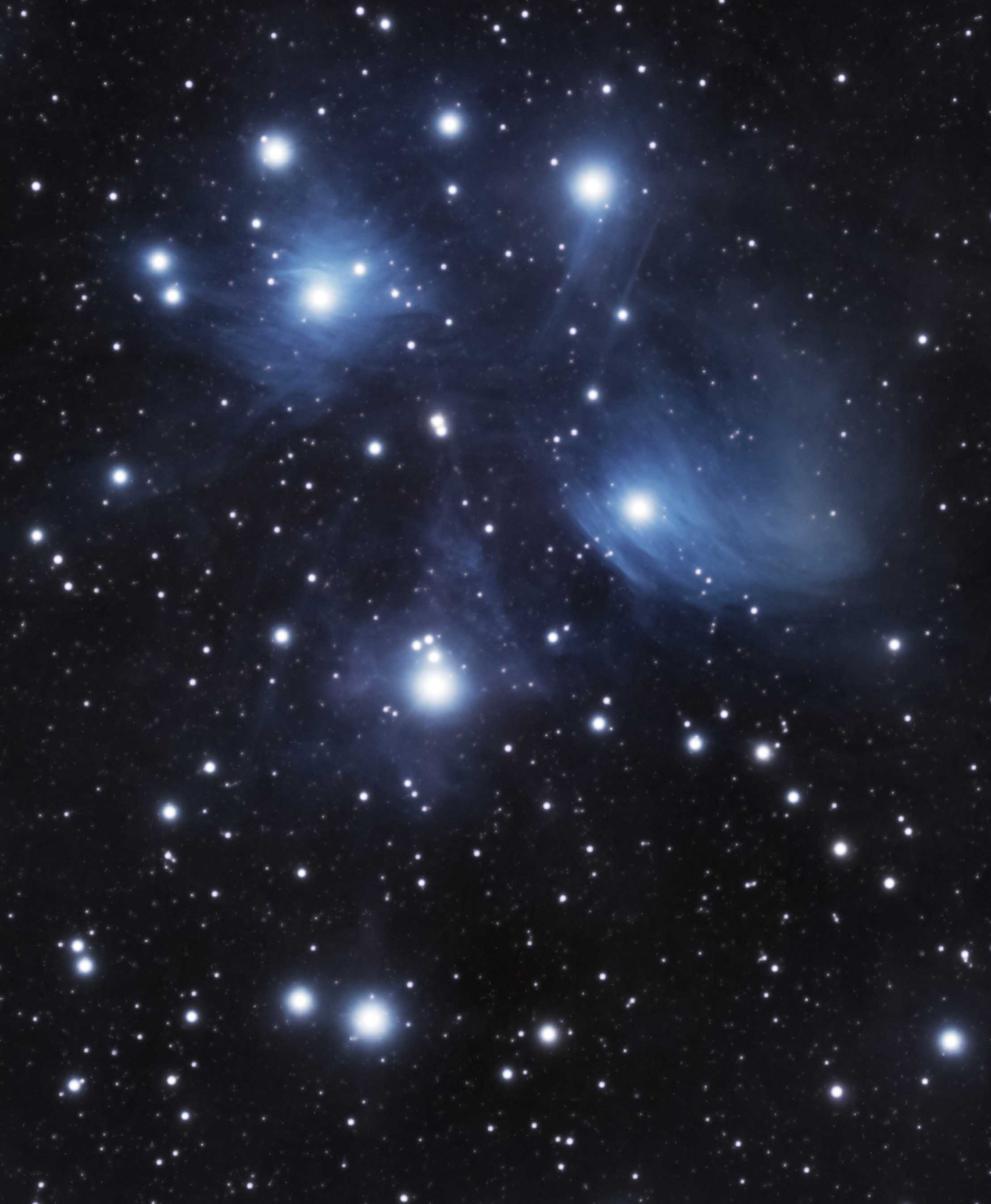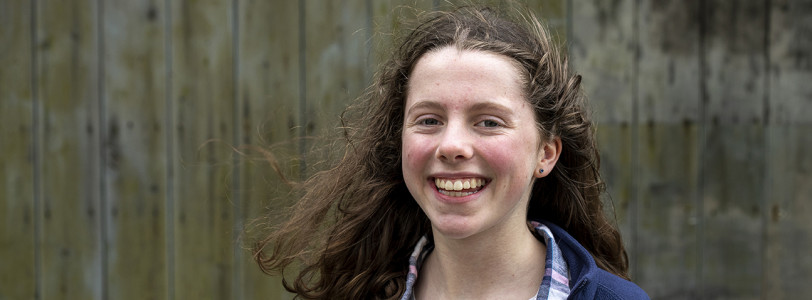Could you first introduce yourself to the reader?
My name is Helena Cochrane, and I am a 16-year-old deep space astrophotographer from Scotland! Basically, what this means, is every clear night I get, I take myself out into my cold, dark back garden to photograph nebulae and galaxies millions of light years away.
When did your fascination with space first come about, and what is it about space you love?
I've always had a love for the night sky from a very young age but when I took part in a project titled 'Life on Other Planets' in primary school, it made me want to know more. I wanted to be the one, discovering aliens in my back garden (or at least that's how I put it back then haha)! Mum and Dad bought a small telescope for my 10th birthday which sat on the windowsill in the kitchen. From there, I'd spend ages looking at the moon in close detail and was constantly amazed at how someone so far away, could see an object so close!
As I got older, I began navigating my way around the night sky, slowly using bigger telescopes to view the gas giants (Jupiter and Saturn) when they were visible too. I decided I wanted to share this feeling with others, the feeling of excitement I got when seeing something so spectacular! That's when I discovered astrophotography. I started a YouTube channel (Helena's Astrophotography) to show what it was like building up from nothing, to becoming a deep space astrophotographer. I don't regret a second if it!
Apparently you have an observatory in your garden?! Can you tell us about it please?
Yeah! When I was 12 years old, I applied for a children’s television show called the CBBC Dengineers. Their aim was to provide younger people a dream space, where they could unleash their creativity and continue their passion. Thinking nothing of it, I applied for an Observatory (which I now use for filming and storage) in my back garden. Working with the team on set fascinated me and I think that it’s what sparked my love for film, and beginning YouTube.
What equipment do you use to capture your photographs?
There are many accessories astrophotographers need to use, but the few main pieces of equipment are the mount (to track the sky), the imaging camera, the telescope and the laptop. As you can imagine, there are many different variations of each product made by a variety of different companies! I'm going to break down the imaging camera side of things as an example.
There are technically three main types of imaging cameras you can use to take deep space images. A DSLR, which many people own already. They are the first thing that comes to mind when you think of a camera and some of the most popular manufacturers are Canon and Nikon.
I, myself, use the second type of imaging camera which is a dedicated astrophotography imaging device. It looks nothing like a camera - haha! The main difference between one of these and a DSLR is that the sensor inside can be temperature controlled. I normally take shots at -20 degrees below zero. This is done to reduce noise in the image (best described as grainy pixels) which can destroy faint details in objects.
The third, and most expensive, option is a monochrome dedicated astrophotography camera. Similar to the last one I mentioned, except the images taken come out black and white! We use filters to differentiate between the colour channels and build a colour image. This is a more popular version for advanced astrophotography as mono cameras are more sensitive to light and more efficient when capturing photons. I'll try and explain this in the simplest way possible! Each sensor is made up of pixels which capture photons. Between each of these pixels is a gap where photons can get lost and not detected (known as low quantum efficiency). Colour cameras have three times as many of these gaps compared with monochrome cameras! Therefore, the likelihood of these photons getting lost between gaps is much smaller in black and white cameras.
What are some of the challenges of trying to capture the stars on camera?
Astrophotography is a very challenging and unique hobby. There was a period of six months when I'd go outside, set up and come in with nothing – no results to show. The main challenge out of many you have to tackle is being able to precisely track the stars as they move around the sky. This is done by using specialist mounts to counteract the rotation of the Earth (as it's the Earth that's moving, not the stars). Why do we do this? Deep Sky Objects, as you can imagine, are extremely faint. Therefore, we need to take many long exposure shots for the best results. There are lots of factors that affect how good your guiding is when carrying this out. This can be from getting your computer and mount communicating correctly, aligning your mount beforehand with the North Celestial Pole and balancing the payload. I'm really not selling this hobby very well haha! But trust me, once you see that perfect image come in, the feeling is like nothing else.
You run a YouTube channel to help people who might be completely new to astrophotography. Could you tell us more about it?
I started my YouTube channel in April of 2019, in the hope of shedding some light on this painfully humbling hobby! There were so many inspirational astrophotography YouTubers when I began filming videos, but one thing I noticed was nobody was starting their channel from the absolute beginning. A lot of them had already been taking photos for a few months, and me? Well, I knew nothing. Now, being able to say I am a deep space astrophotographer, is the most incredible feeling. Through YouTube and my tutorials, I aim to be giving back what this wonderful community has given to me. Another huge passion I have is inspiring younger women in science. In 2019, I could count the girls I knew who did astrophotography in one hand. Now, times have completely changed, and I’m honoured to be a part of that change. I’ve connected with the most incredible group of women, called STELA (Striving to Engage Ladies in Astrophotography) and I am a very proud team member.
Do you have an interest in photography outside of astrophotography? Do you have any other hobbies that might surprise people?
I definitely had a passion for taking photos before astrophotography. It was mostly landscapes, but I’ve now been able to incorporate landscapes into astro as well which has been fantastic. I’ve sort of devoted all my time to taking photos of deep space, as I feel like it needs my full attention. On top of school and YouTube, I manage to keep quite busy and there are times I have to stop, to concentrate on my studies!
Out of all the pictures you’ve captured so far, what has been your favourite and why?
My favourite image I have captured so far is definitely M45, The Pleiades. This is a Winter constellation which is best seen in December and is known as a reflection nebula! I took it during the new moon, which meant I had no sources of light pollution and could take full advantage of my skies.
 Helena Cochrane: M45, The PleiadesDo you have a career plan in mind? What is the dream job for you right now?
Helena Cochrane: M45, The PleiadesDo you have a career plan in mind? What is the dream job for you right now?
As far as a future career goes, my dream would be to work within the astrophotography community, creating content and giving back what they gave me. There are so many places I would love to go and visit, and so many people I want to meet! However, I plan to go to university first and gain a degree in either the arts or physics. I am completely split down the middle at the moment as I love them both so, so much!
It’s very likely that commercial space flights will be a reality in our lifetime. Would you take a trip into space if it was offered to you?
In the hope of not scaring Mum and Dad, of course I would! I think it would be such a surreal experience and allow me to see the world from a whole new perspective. However, there is the other half of me that would feel safer watching it happen rather than being strapped to the actual rocket – haha!
And would you consider leaving Earth to go live on Mars?
If we are talking about a one-way ticket, only if I’ve got my camera. Honestly, technology is developing so fast within the space industry and the fact that people could be setting foot on Mars in my lifetime is incredible. I’d like to still have a connection with both planets, so if they were within easy reach of each other, I’d be more inclined to say yes!
Who are some of your role models, and who would you love to work with in the future?
I have so many role models within the astrophotography community. All of the STELA members inspire me on the daily. I want to grow up to be like them! Everyone I’ve met online, I plan on meeting in real life to work on collaborations with them one day. Specifically, I want to fly over to California and work with OPT, the largest telescope authority in the world. They’ve been so supportive of my work ever since the beginning and we’ve already worked on stuff together. I can’t wait to see what the future holds!
What do you think is the most exciting scientific advancement of the last year, or what are you really excited for in the future?
As I said earlier, I am so excited for humans landing on Mars, but within that comes even more exciting projects. It is planned that we are going to return to the moon, build bases there and launchpads as a stepping stone to Mars. That as a stand-alone mission is going to be incredible to watch and is happening very soon!
Where can people find out more about what you do?
I get messages via email, Instagram and Facebook everyday with astrophotography and space related questions. Don’t hesitate to get in touch! I try to get through as many people as possible. This community is like no other and I am more than happy to provide help in areas I can. On my YouTube channel, I have a list of fellow creators and astrophotographers, who have personally inspired me and been such an awesome help. Click on all of their channels and check out their work. They put so much time into their content, and like myself, are so, so happy to help!
And is there anything else you would like to add?
Do it. That thing you’ve been wanting to do for ages, go for it. Life is short and the world is your oyster! Anything is possible when you put your mind to it.
Helena is talking on a panel as part of Wigtown Book Festival on 6 March 2021, which is available to watch online. You can find more details here.









Really interesting read!